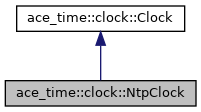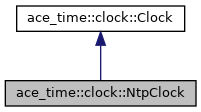A Clock that retrieves the time from an NTP server. More...
#include <NtpClock.h>


Public Member Functions | |
| NtpClock (const char *server=kNtpServerName, uint16_t localPort=kLocalPort, uint16_t requestTimeout=kRequestTimeoutMillis) | |
| Constructor. More... | |
| void | setup (const char *ssid=nullptr, const char *password=nullptr, uint16_t connectTimeoutMillis=kConnectTimeoutMillis) |
| Set up the WiFi connection using the given ssid and password, and prepare the UDP connection. More... | |
| const char * | getServer () const |
| Return the name of the NTP server. | |
| bool | isSetup () const |
| Return true if setup() suceeded. | |
| acetime_t | getNow () const override |
| Return the number of seconds since the AceTime epoch (2000-01-01T00:00:00Z). More... | |
| void | sendRequest () const override |
| Send a time request asynchronously. | |
| bool | isResponseReady () const override |
| Return true if a response is ready. | |
| acetime_t | readResponse () const override |
| Returns number of seconds since AceTime epoch (2000-01-01). More... | |
 Public Member Functions inherited from ace_time::clock::Clock Public Member Functions inherited from ace_time::clock::Clock | |
| Clock ()=default | |
| Default constructor. | |
| ~Clock ()=default | |
| We deliberately avoid using a virtual destructor. More... | |
| virtual void | setNow (acetime_t) |
| Set the time to the indicated seconds. More... | |
Static Public Member Functions | |
| static acetime_t | convertNtpSecondsToAceTimeSeconds (uint32_t ntpSeconds) |
Convert an NTP seconds to AceTime seconds relative to the current AceTime epoch defined by Epoch::currentEpochYear(). More... | |
Static Public Attributes | |
| static const char | kNtpServerName [] = "us.pool.ntp.org" |
| Default NTP Server. | |
| static const uint16_t | kLocalPort = 2390 |
| Default port used for UDP packets. | |
| static const uint16_t | kRequestTimeoutMillis = 1000 |
| Request time out milliseconds. | |
| static const uint16_t | kRequestTimeout = kRequestTimeoutMillis |
| Deprecated. More... | |
| static const uint16_t | kConnectTimeoutMillis = 10000 |
| Number of millis to wait during connect before timing out. | |
 Static Public Attributes inherited from ace_time::clock::Clock Static Public Attributes inherited from ace_time::clock::Clock | |
| static const acetime_t | kInvalidSeconds = LocalTime::kInvalidSeconds |
| Error value returned by getNow() and other methods when this object is not yet initialized. | |
Detailed Description
A Clock that retrieves the time from an NTP server.
This class has the deficiency that the DNS name resolver WiFi.hostByName() is a blocking call. So every now and then, it can take 5-6 seconds for the call to return, blocking everything (e.g. display refresh, button clicks) until it times out.
NTP seconds is an unsigned 32-bit integer offset from the NTP epoch of 1900-01-01. It rolls over every 136 years, with the first rollover happening just after 2036-02-07 06:28:15 UTC. Each NTP rollover enters into the next NTP Era. I have seen documentation that says that NTP v4 packets contain the NTP era number but I have yet to find information on how to extract that number. So currently this class ignores the NTP Era from the NTP packet. Instead, the NTP Era is automatically inferred to be the ones that completely span the currently defined AceTime epoch range, as described next.
The AceTime seconds is a signed 32-bit integer with a range of 136 years centered around the Epoch::currentEpochYear(). This class converts NTP seconds to AceTime seconds by mapping the the AceTime seconds range onto the NTP seconds range, straddling any NTP era necessary to meet the AceTime seconds range. For example, for the default AceTime v2 epoch of 2050, the NTP seconds will be interpreted to be from 1982 to 2118, crossing from NTP era 0 to NTP era 1. If the AceTime epoch is changed to 2150, then the NTP seconds will be interpreted to be from 2082 to 2218, crossing from NTP era 1 to NTP era 2.
Warning: If you are using an ESP8266, AND you are using the analogRead() function, calling analogRead() too quickly will cause the WiFi connection to disconnect after 5-10 seconds. Calling NtpClock::setup() will not fix the disconnect. See https://github.com/esp8266/Arduino/issues/1634 and https://github.com/esp8266/Arduino/issues/5083. The solution is to add a slightly delay between calls to analogRead(). I don't know what the minimum value should be, but using a 10ms delay (i.e. no faster than 100 times a second) seems to work for me.
Borrowed from https://github.com/esp8266/Arduino/blob/master/libraries/ESP8266WiFi/examples/NTPClient/NTPClient.ino and https://github.com/PaulStoffregen/Time/blob/master/examples/TimeNTP/TimeNTP.ino
TODO: Create a version that uses a non-blocking DNS look up.
Definition at line 68 of file NtpClock.h.
Constructor & Destructor Documentation
◆ NtpClock()
|
inlineexplicit |
Constructor.
- Parameters
-
server name of the NTP server (default us.pool.ntp.org) localPort used by the UDP client (default 8888) requestTimeout milliseconds for a request timeout (default 1000)
Definition at line 91 of file NtpClock.h.
Member Function Documentation
◆ convertNtpSecondsToAceTimeSeconds()
|
static |
Convert an NTP seconds to AceTime seconds relative to the current AceTime epoch defined by Epoch::currentEpochYear().
Since NTP epoch is 1900-01-01 and is due to rollover just after 2036-02-07 06:28:15, this function automatically accounts for the rollover of NTP seconds by shifting the NTP seconds into AceTime seconds using modulo 2^32 unsigned operations.
The result of this function is that it takes the entire 32-bit range of the (signed) AceTime seconds (centered around the currentEpochYear(), and overlays it on top of the (unsigned) NTP seconds time line (with rollovers into new NTP eras every 2^32 seconds), and converts each NTP seconds (regardless of its NTP era) into its corresonding AceTime seconds.
Definition at line 172 of file NtpClock.cpp.
◆ getNow()
|
overridevirtual |
Return the number of seconds since the AceTime epoch (2000-01-01T00:00:00Z).
Returns kInvalidSeconds if an error has occured.
This is a blocking call. Some clocks (e.g. NTP client) this may take many seconds. On those clocks, use the asynchronous methods (sendRequest(), isResponseReady(), and readResponse()) instead.
Implements ace_time::clock::Clock.
Definition at line 58 of file NtpClock.cpp.
◆ readResponse()
|
overridevirtual |
Returns number of seconds since AceTime epoch (2000-01-01).
Return kInvalidSeconds if there is an error. Valid only if isResponseReady() returns true.
Reimplemented from ace_time::clock::Clock.
Definition at line 123 of file NtpClock.cpp.
◆ setup()
| void ace_time::clock::NtpClock::setup | ( | const char * | ssid = nullptr, |
| const char * | password = nullptr, |
||
| uint16_t | connectTimeoutMillis = kConnectTimeoutMillis |
||
| ) |
Set up the WiFi connection using the given ssid and password, and prepare the UDP connection.
If the WiFi connection was set up elsewhere, you can call the method with no arguments to bypass the WiFi setup.
- Parameters
-
ssid wireless SSID (default nullptr) password password of the SSID (default nullptr) connectTimeoutMillis how long to wait for a WiFi connection (default 10000 ms)
Definition at line 21 of file NtpClock.cpp.
Member Data Documentation
◆ kRequestTimeout
|
static |
The documentation for this class was generated from the following files:
- /home/brian/src/AceTimeClock/src/ace_time/clock/NtpClock.h
- /home/brian/src/AceTimeClock/src/ace_time/clock/NtpClock.cpp